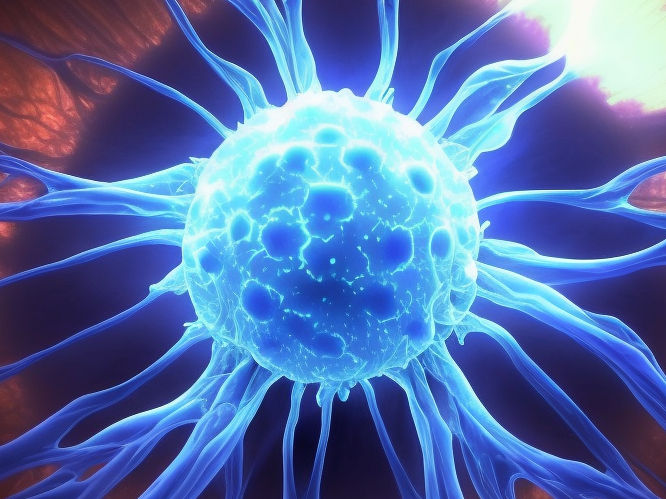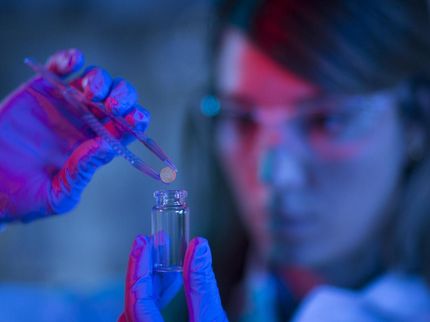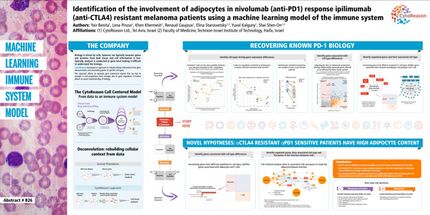New cancer vaccine strategy
Defence Therapeutics and CQDM fund the development of a new cancer vaccine platform
Defence Therapeutics and CQDM announced the launch of a collaborative research project between Université de Montréal (UdeM), the Lady Davis Institute of the Jewish General Hospital and Defence Therapeutics, a Quebec-based biotechnology company specialized in the development of next-generation vaccines. The funding of this study, totalling $1,359,851, was made possible through a $601,938 grant from the Ministère de l'Économie, de l'Innovation et de l'Énergie (MEIE) and a financial contribution of $757,913 from Defence Therapeutics.

Symbolic image
Computer-generated image
“By conducting collaborative research, such as that done by Dr. Rafei’s team, new therapeutic strategies and new vaccines can be developed. We will continue to support researchers and organizations that work tirelessly to find innovative treatments to improve Quebecers’ quality of life,” says Pierre Fitzgibbon, Minister of Economy, Innovation and Energy, Minister Responsible for Regional Economic Development and Minister Responsible for the Metropolis and the Montreal Region.
“CQDM is pleased to contribute to the efforts of the biotechnology company Defence Therapeutics by supporting the development of an all-new vaccine approach that promotes more effective presentation of tumour antigens to immune effector cells," said Véronique Dugas, Vice President of Scientific Affairs at CQDM. “This is an innovative immunotherapy strategy that could be applied to the treatment of a wide range of cancers and improve the lives of many patients."
“The versatility of Accum technology is what continually drives Defence Therapeutics to be on the cutting-edge and to excel in the development of novel innovative strategies to successfully fight against several types of cancer," said Sébastien Plouffe, president of Defence Therapeutics. “We sincerely thank Mr. Fitzgibbon and the MEIE, as well as CQDM, for their financial support, with a strong potential for success, in collaboration with Université de Montréal and the Jewish General Hospital in order to advance this project under development into the clinical phase for the potential benefit of patients diagnosed with cancer."
Cancer vaccines are based on a promising immunotherapy strategy that has been extensively studied over the past decade. To date, these vaccines have failed to meet clinical expectations. Generating an effective and safe immune response is a major challenge that this new initiative aims to address.
To meet the challenge, the research team led by UdeM professor Moutih Rafei, in collaboration with Prof. Nicoletta Eliopoulos and Dr. Philippe Lefrançois of the Lady Davis Institute of the Jewish General Hospital, aims to develop and test a novel cancer vaccine using AccumTM technology, a biological platform originally designed to improve the delivery of biologics into target cells. Preclinical studies have shown that this approach enables the conversion of mesenchymal stem cells into potent antigen-presenting cells capable of activating the patient's immune defence against cancer. In this project, Prof. Rafei and his collaborators plan to finalize their preclinical studies, establish the vaccine's manufacturing protocol, and conduct a Phase I trial in patients diagnosed with melanoma. It is expected that this technology will be simpler and less expensive to produce compared with other approaches now in development.
“This project is a major step forward in our fight against cancer and may significantly transform the field of cellular vaccination by targeting other tumour types in the future,” said Prof. Moutih Rafei.
This collaborative project will allow Defence Therapeutics to validate the efficacy of the AccumTM platform as a therapeutic option against cancer while developing new innovative vaccine strategies, which could contribute to increasing its attractiveness to local and international investors. Due to its versatility, the AccumTM technology, that is also being studied in the context of infectious diseases, could be applied to a broad range of cancers and have a significant positive impact on a large number of patients in Quebec and around the world.
Other news from the department business & finance
Most read news
More news from our other portals
Something is happening in the life science industry ...
This is what true pioneering spirit looks like: Plenty of innovative start-ups are bringing fresh ideas, lifeblood and entrepreneurial spirit to change tomorrow's world for the better. Immerse yourself in the world of these young companies and take the opportunity to get in touch with the founders.























































